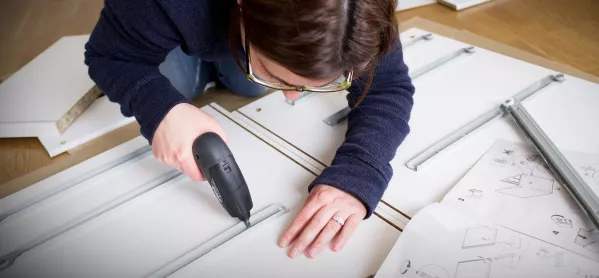- Home
- Revealed: DfE’s 16-point September school opening plan
Revealed: DfE’s 16-point September school opening plan

Face coverings and circular tables are to be banned and non-core subjects potentially dropped, according to reports outlining a 16-point government plan for a full school return in September.
The proposals also include a 15-minute limit on the time teachers can spend within a metre of other people, and a repeat of the primary syllabus in core subjects for Year 7 pupils, reports suggest.
Priority: DfE ‘puts full attendance above teacher safety rotas’
Criticism: Leaked DfE school opening plan is ‘undoable fantasy’
Related: Heads welcome whole-year ‘bubble’ plan for secondaries
Distancing: ‘Does the DfE understand how schools work?’
The plans, outlined today in the Huffington Post, cover everything from social distancing, to seating plans, attendance fines, suspended inspections and curriculum expectations.
They include the suggestion that non-core subjects could be suspended for two terms and some children may have to drop a selection of GCSEs altogether, in order to make time for catch-up in subjects such as English and maths.
There is also a requirement for heads “not to put in any staff rota or physical distancing that would require extra space or make it impossible for all pupils to return full-time”.
Coronavirus: How schools could be fully reopened
Tes understands that the plans, expected to be announced on Thursday, are still at the draft stage and could yet be altered following consultation with teaching unions.
At the moment they are reported to include the following:
- No in-class social distancing requirement for primary pupils, with secondary pupils advised to stay 1m apart but not at all times.
- Teachers advised to keep 2m away from pupils, at the front of the class, and away from colleagues as much as possible, as if in a supermarket.
- Schools advised against routine temperature tests of pupils as it is “not a reliable method” for identifying coronavirus.
- Compulsory engagement with the NHS Test and Trace system, with whole classes or year groups liable to be sent home if a pupil tests positive, but whole-school closure not seen as generally necessary.
- No face coverings for pupils or teachers, on Public Health England advice, as they “interfere” with teaching and learning.
- Children seated facing forwards in same direction and not at circular tables, with pupils wearing normal uniform and washing hands throughout the day.
- Teachers advised to spend no more than 15 minutes at any one time closer than 1m to anyone.
- Fines of up to £120 for parents whose children fail to attend school. In contrast with the “softly softly” approach taken during full lockdown, the message will be “education is not optional”.
- “Robust” measures will be taken to engage with families where children had been persistently absent prior to the pandemic or who have not engaged with school regularly during the pandemic.
- Heads told not to put in any staff rota or physical distancing that would require extra space or make it impossible for all pupils to return full-time.
- Contingency plans for some or all of the school being put in local lockdown, with any temporary return to “remote” teaching needing to be of a high quality.
- Some subjects for some or all pupils may have to be suspended for two terms to allow catch-up on core subjects such as English and maths, with a full spread of subjects returning in the summer term of 2021.
- Some students may have to drop some GCSEs altogether in Year 11 to allow them to catch up and achieve better grades in English and maths. GCSEs and A levels to take place as planned next summer but with some “adaptations”.
- First-year students at secondary school may have to be retaught English and maths from their final year syllabus at primary level.
- A new focus on tackling “persistently disruptive” pupils because increased poor behaviour is seen as more “likely” due to a lack of regular schooling and discipline in lockdown.
- Routine Ofsted inspections will remain suspended for the autumn term but inspectors will visit a sample of schools to discuss how they are resuming classroom teaching.
Keep reading for just £1 per month
You've reached your limit of free articles this month. Subscribe for £1 per month for three months and get:
- Unlimited access to all Tes magazine content
- Exclusive subscriber-only stories
- Award-winning email newsletters



